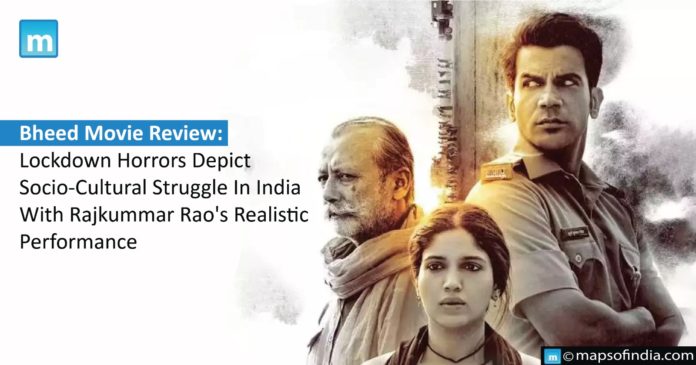Director: Anubhav Sinha
Starring: Bhumi Pednekar, Pankaj Kapur, Rajkummar Rao
Rating: 3/5
Bheed is more of a cross-sectional narrative of contemporary India, reflecting on one of its worst periods. The Anubhav Sinha film is about the first few weeks of the first lockdown imposed in India during Covid-19 in 2020. As the wealthy were at home enjoying repeats of Doordarshan oldies, countless were on the highway with one goal: going home. The narrative of those folks is told in Bheed.
Storyline
Surya Kumar Singh, portrayed by Rajkummar Rao, runs a police checkpoint at Tejpur, a hamlet on the state border approximately 1200 kilometres from Delhi, where hundreds of people are attempting to pass across to return home. This features a worried mother, portrayed by Dia Mirza, eager to see her teenage daughter, a busload of migrants accompanied by a watchman (Pankaj Kapur), and numerous other characters. Surya has reconciled their requests with challenges from his superior, portrayed by Ashutosh Rana and the overzealousness of his coworker Ram Singh represented by Aditya Shrivastava. In a side narrative, he struggles with his social standing as a person of the so-called “lower caste,” especially as he falls in affection with a lady from another caste, a graduate practitioner portrayed by Bhumi Pednekar.
Uniqueness
The very first thing you observe regarding Bheed is the monochromatic image. Instead of being blinded by 2000 colours, you focus on the performers’ expressions, brightness, and gloom. That solidifies the film’s realism and distinguishes it from the many documentaries on the outbreak and lockdowns. Bheed appears to be genuine. Viewing it transports you down to those difficult days in March 2020, and you realise you’re not seeing actors on a giant screen but real people with genuine aches and tears.
Performances
Surya, a guy among the have-nots who has become a cop, is played by Rajkummar Rao. There are several complexities in how Anubhav and Raj build this guy who has only learned to take commands and never offer them from the ground up. When he has authority, he must demonstrate how he will utilise it. Add to it the fact that the world will not let him recall his roots and use them against him. Rao has a rare talent for seeming vulnerable on camera, and he does it effectively.
Bhumi Pednekar, as a girl from a superior position in society, has faced her own set of challenges. The actress is fantastic at what she does. Yet, the narrative concentrates on her emotional feelings for Surya rather than what she experiences as a doctor. The two have a needless personal scene in which Surya expresses his fear of touching a girl from a higher caste.
Direction
Anubhav Sinha has plenty to say about the issue, as seen by how he arranges themes in the same frame. The finest aspect is how he installs a working mall just meters from the border where the trapped immigrants are. Several are the daily wage labourers who helped build the mall but are now barred from entering. At some point, Ashutosh Rana even adds, ‘Mall ban jaane ke baad uske andar mazdoor ke jaane ki parampara nhi hai.’ That tells a lot about how we treat individuals.
Verdict
Bheed is a confluence of a necessary discussion and an ethos that dominates that discussion. It’s a perplexing watch, but it has merit and should not be overlooked.





